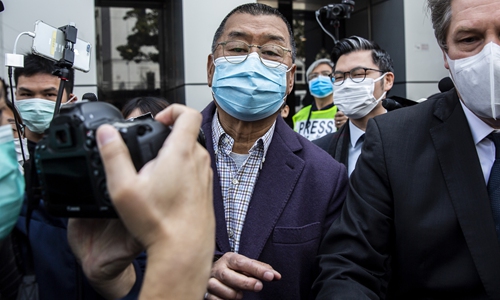‘Traitor’ Jimmy Lai opens Twitter account, remarks ‘could provide evidence of subversion under new national security law’

Hong Kong riot supporter Jimmy Lai (center) leaves the Kowloon City police station in Hong Kong on Friday after being arrested for taking part in an unauthorized assembly on August 31, 2019. Photo: AFP
Jimmy Lai Chee-ying, a key anti-government figure in Hong Kong and founder of Apple Daily, who has been dubbed a "modern-day traitor," has opened a Twitter account to seek public attention, but instead provided evidence for national security agencies for acts of subversion, experts warned.
Lai joined Twitter on Friday after the third session of the 13th National People's Congress (NPC) announced to establish and improve the legal framework and enforcement mechanisms in order to safeguard national security in Hong Kong.
From Friday to Sunday as of press time, Lai posted more than 20 tweets, most of which attacked the new national security law, saying it would "hurt human rights and freedom." For example, on Friday, he tagged the US President Donald Trump, saying "Trump remarked 'HK's gone through a lot.' Rarely have HK people heard more sympathetic words about their plight. Coming from the most powerful leader of the world means a lot," which resulted in the public blasting him for openly colluding with foreign forces.
A netizen said Trump also praised China's handling Hong Kong's riots. "He said that last year. Surely you haven't forgotten, sir," the netizen said.
Another commented, "He is doing his last madness, and is worried about becoming the first person to be sanctioned by the National Security Law."
Lai was one of the 15 riot leaders arrested by the Hong Kong police on April 18 on suspicion of being the mastermind behind illegal assemblies and riots during the 2019-2020 political turmoil in Hong Kong. He was released on bail after a court arraignment was postponed at Hong Kong's West Kowloon Magistrates' Courts on May 18.
During the months of protests that turned into riots, which heavily impacted Hong Kong's social stability, Lai and other anti-government figures have had unprecedented levels of contact with the US government and Western parliaments, forming increasingly brazen collusion tactics that have fuelled the expansion of street politics in Hong Kong, observers said.
Lai once said in public to a US think tank that he is leading a war in Hong Kong for the US fight against the mainland government. "We are on your side sacrificing our lives, our freedom, everything we have, fighting this war in the frontier for you."
Experts said once the national security law is implemented, Lai's Twitter remarks could serve as evidence of subversion of sovereignty.
Li Xiaobing, an expert on Hong Kong, Macao, and Taiwan from the Nankai University in Tianjin, told the Global Times on Sunday that the national security law in Hong Kong obviously unnerves traitors like Lai who continuously bring chaos and disorder to Hong Kong, and prompted Lai to openly plead for help from Trump who ironically was considered by Lai as a savior for Hong Kong.
As a major activist who colluded with external forces to undermine the rule of law in Hong Kong and cross the bottom line of "one country, two systems, " Lai cannot escape from the punishment of the national security law, Tian Feilong, a Hong Kong affairs expert at Beihang University in Beijing, told the Global Times.
In addition to Lai, the young leader of violent protests in Hong Kong, Joshua Wong Chi-fung, last year constantly tweeted to gain attention and begged for US legislators to vote on the Hong Kong Human Rights and Democracy Act of 2019, which would "give the president of the United States the power to penalize Chinese officials who interfere in Hong Kong affairs."
However, the passing of the bill for so-called human rights and democracy only provided more solid evidence proving that the protesters have colluded with Western politicians, observers noted.
Lai, Wong and other separatists' use of social media to seek attention just reflects their desperation, observers said.
The proposed national security law in Hong Kong indicates the central government's firm determination to fix the loopholes within the legislative system of the HKSAR, while intervention and stigmatization from external forces and local separatists continue to erode the foundation of the city, deputies and members to the two sessions told the Global Times. And this also shows that the central government will safeguard China's core interests at all costs.


